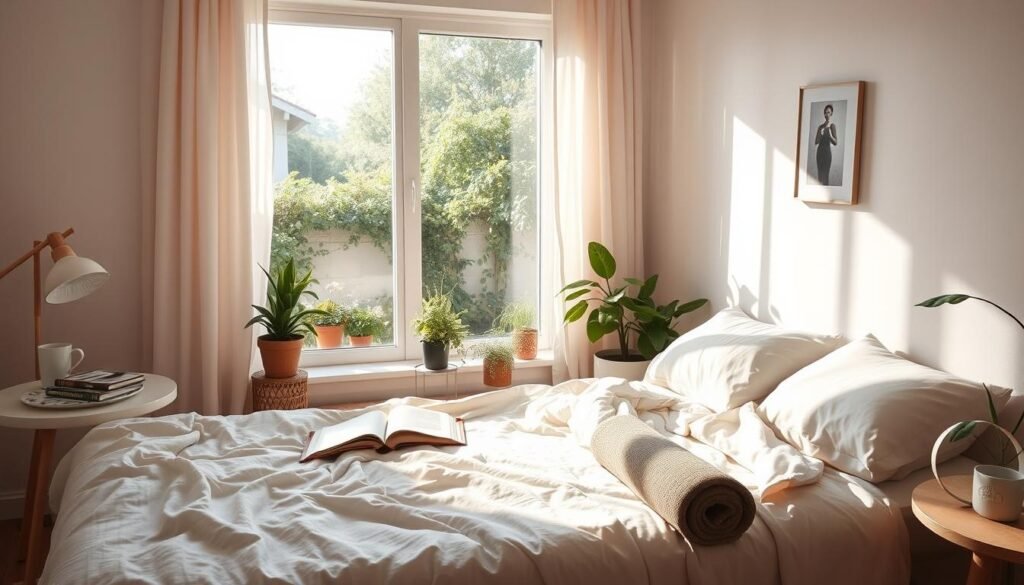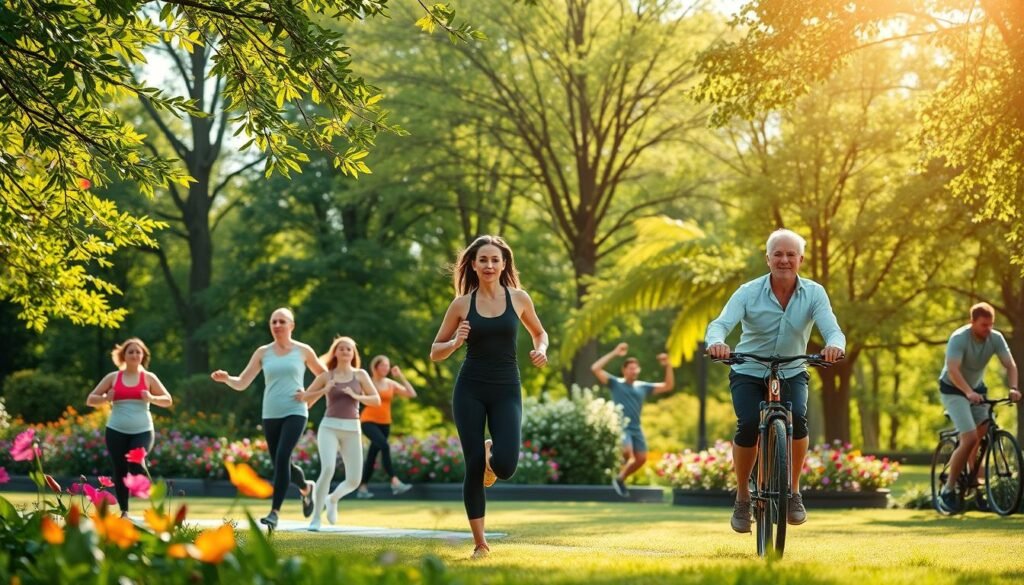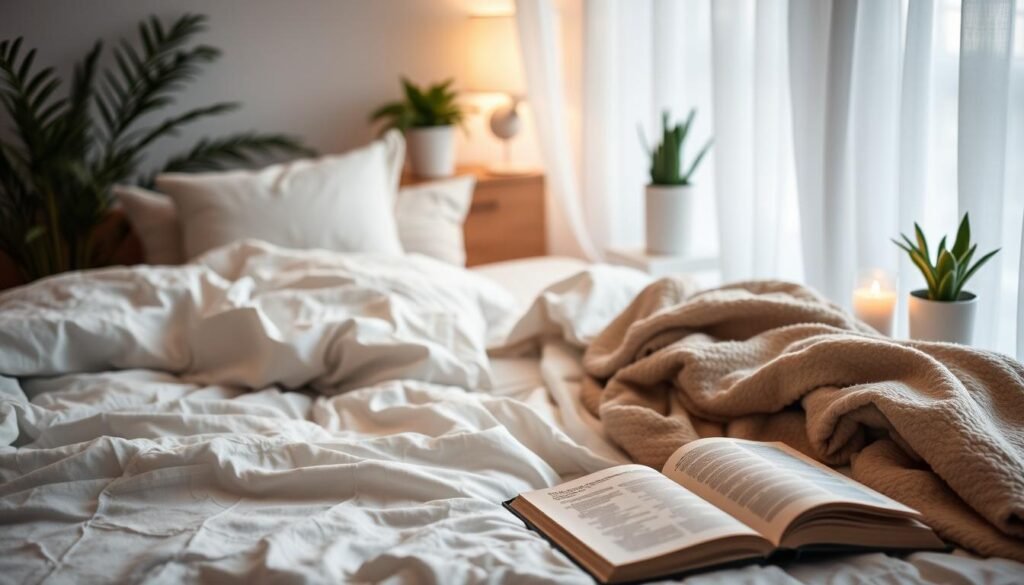Did you know 83% of Americans feel stressed at work? In today’s fast world, self-care is key for staying healthy. Adding simple self-care habits to your day can greatly improve your life.
This article will show you important self-care practices for a better life. We’ll cover the basics of self-care and how to make routines that work for you. You’ll learn how to handle stress, work better, and feel more fulfilled.
Key Takeaways
- Self-care is a vital part of staying well in today’s world.
- Adding self-care to your life can lower stress and make it more balanced.
- Creating self-care routines that fit you is key for lasting success.
- Mindfulness, exercise, and healthy food are basic parts of good self-care.
- Setting healthy boundaries, managing digital use, and getting enough sleep are also important.
Understanding the Fundamentals of Self-Care Practices
In today’s fast world, emotional well-being, work-life balance, and healthy habits matter a lot. Self-care can greatly improve our lives. Let’s explore the basics of self-care and why it’s good for us.
Defining Self-Care in Modern Life
Self-care means taking care of your body, mind, and feelings. It’s about doing things that help you relax, feel better, and find balance. It includes activities like meditation and setting limits, which make life more rewarding.
The Science Behind Self-Care Benefits
Many studies prove self-care is good for us. It helps reduce stress, improves mood, and boosts productivity. By focusing on self-care, we become stronger, find purpose, and feel happier.
Breaking Common Self-Care Myths
- Myth: Self-care is selfish or indulgent.
- Fact: Self-care is a necessary investment in your emotional well-being and overall health.
- Myth: Self-care requires a significant time commitment.
- Fact: Even small, consistent self-care practices can have a profound impact on your work-life balance and healthy habits.
- Myth: Self-care is only for those with specific needs or challenges.
- Fact: Self-care is essential for everyone, regardless of their circumstances or life stage.
Understanding self-care and its benefits is the first step to a better life. It leads to a more mindful, balanced, and fulfilling life.
Creating Your Personalized Morning Wellness Routine
Creating a morning wellness routine can greatly improve your mental health and personal growth. Mix relaxation methods, mindfulness, and healthy habits for a productive day. Find a routine that fits your needs and preferences for balance and rejuvenation.
Begin with a mindful moment. This could be meditation, deep breathing, or gratitude. It helps you start the day with clarity and purpose. This step is crucial for a relaxation methods-rich morning.
- Start with light physical activity. Yoga, a walk, or stretching energizes your body and mind for a productive day.
- Eat a healthy breakfast. Choose foods that fuel your mental health and keep you going.
- Do something creative or educational. Reading, journaling, or learning a new skill boosts personal growth and satisfaction.
Consistency and personalization are key to a great morning routine. Try different relaxation methods and activities to find what works best for you.

“The way we start our day often sets the tone for the rest of it. Investing in a personalized morning wellness routine can be a game-changer for your mental health and overall wellbeing.”
| Wellness Activity | Benefits | Time Commitment |
|---|---|---|
| Meditation | Improved focus, reduced stress, and enhanced relaxation methods | 5-20 minutes |
| Light Exercise | Increased energy, better mood, and support for personal growth | 10-30 minutes |
| Healthy Breakfast | Sustained energy, improved mental health, and nourishment for the body | 15-30 minutes |
Mindfulness Meditation for Mental Clarity
In today’s fast world, finding peace is a big act of self-care. Mindfulness meditation is a great way to clear your mind, handle stress, and boost your emotional well-being. By adding these techniques to your day, you can experience the power of being in the moment.
Basic Meditation Techniques for Beginners
Starting with meditation is easy. First, find a quiet spot without distractions. Sit comfortably, either on the floor or in a chair. Focus on your breath, noticing how it moves in and out.
If your mind drifts, gently bring it back to your breath. Start with 5-10 minutes and grow your time as you get more into it.
Incorporating Mindfulness into Daily Activities
- Eat mindfully, noticing the taste, texture, and smell of your food.
- Pay attention to your surroundings during your commute or walks.
- Focus fully on your tasks, like cleaning, to stay present.
Benefits of Regular Meditation Practice
Regular mindfulness techniques can change your life. They help lower stress and anxiety, improve focus, and bring emotional balance. By quieting your mind, you can find clarity and peace that improves your life in many ways.

“The ability to observe without evaluating is the highest form of intelligence.” – Jiddu Krishnamurti
| Benefit | Description |
|---|---|
| Stress Reduction | Meditation lowers cortisol, the stress hormone, making you feel calmer. |
| Improved Focus | Regular practice sharpens your focus and boosts productivity. |
| Emotional Regulation | Mindfulness meditation increases self-awareness and emotional control. |
Physical Exercise as a Form of Self-Care
Looking for better healthy habits, stress management, and a good work-life balance? Physical exercise is key. It’s not just good for your body but also for your mind. This makes it a must-have in your self-care routine.
Whether it’s a morning jog, a yoga session, or a HIIT workout, exercise offers many benefits. It boosts your mood, lowers stress, and makes you feel good overall. This is thanks to the endorphins it releases.
Adding physical exercise to your self-care can change your life. Here’s how:
- Try different exercises like strength training, cardio, or yoga. Find what you like.
- Start small and gradually increase your workouts. This will help you grow and see results.
- Try new things or join a fitness class. This keeps your routine exciting.
- Make exercise a priority. Schedule it like any other important activity.
By making physical exercise a regular part of your self-care, you’ll enjoy many benefits. You’ll feel mentally clear, resilient, and more satisfied with life.
“Exercise is not only a physical activity, but also a powerful tool for mental and emotional well-being. When you move your body, you move your mind.”

Nourishing Your Body Through Mindful Eating
Healthy habits are key to self-care. Mindful eating is a powerful way to nourish our bodies and minds. It helps us understand our eating habits better.
Understanding Emotional Eating Patterns
Our relationship with food is more than just hunger. Emotional eating is a way to deal with stress or boredom. Recognizing these patterns helps us find better ways to cope.
Planning Balanced Meals for Optimal Health
- Eat a variety of whole, nutrient-rich foods every day.
- Choose plant-based foods like fruits, veggies, whole grains, and legumes for vitamins and fiber.
- Make sure your meals have lean proteins, healthy fats, and complex carbs for energy and health.
Hydration and Its Impact on Wellbeing
Drinking enough water is essential for self-care and emotional well-being. Water helps our bodies, minds, and performance. Drink plenty of water and eat hydrating foods too.
| Optimal Daily Water Intake | Benefits of Proper Hydration |
|---|---|
| Men: 15.5 cups (3.7 liters) Women: 11.5 cups (2.7 liters) |
|

Mindful eating, balanced meals, and staying hydrated are key to healthy habits. They support our emotional well-being and overall health.
Setting Healthy Boundaries in Relationships
Maintaining emotional well-being and growing personally often means setting healthy boundaries. Self-compassion helps us do this by letting us focus on our needs without feeling bad.
It’s key to have clear boundaries for deep connections and to keep our emotional well-being safe. We need to tell others what we need and want in a kind but firm way. This way, our relationships are based on trust, respect, and understanding.
Strategies for Communicating Boundaries
- Use “I” statements to express your feelings and needs, such as “I feel uncomfortable when…” or “I need…”
- Be specific and clear about your boundaries, leaving no room for ambiguity
- Communicate your boundaries calmly and firmly, without apology or justification
- Be prepared to respectfully reiterate or enforce your boundaries if needed
Dealing with conflicts over boundaries can be tough. But with self-compassion and good communication, we can find a way that works for everyone. Remember, setting healthy boundaries is a way to take care of yourself. It makes our relationships stronger and helps us grow personally.
“The greatest gift you can give someone is your own personal boundaries. When you display and enforce healthy boundaries, you teach others how to treat you.”
– Bronnie Ware

Digital Detox and Screen Time Management
In today’s world, screens and technology can affect our balance, relaxation, and mental health. It’s key to find ways to detox from digital and manage screen time wisely. This helps us live a healthier, balanced life.
Creating Tech-Free Zones in Your Home
Make some areas in your home tech-free to avoid constant device checking. Try making your bedroom a digital-free zone for better rest. Also, have tech-free meals to enjoy food and time with family without distractions.
Implementing Digital Wellness Strategies
- Set daily or weekly screen time limits to prevent overuse.
- Use app blockers or screen time management features on your devices to enforce these limits.
- Practice “digital sunsets” by turning off all screens and devices a few hours before bedtime to promote better sleep.
- Try tech-free activities like reading, hobbies, or outdoor activities.
Alternative Activities for Screen-Free Time
Doing things without screens can greatly improve your balance, relaxation, and mental health. Try creative activities like journaling, painting, or learning a new instrument. Physical activities like yoga or hiking can also help. Or, plan gatherings with friends and family without screens.
| Activity | Benefits |
|---|---|
| Meditation | Improves focus, reduces stress, and enhances mental clarity |
| Gardening | Promotes relaxation, connection with nature, and physical activity |
| Reading physical books | Enhances cognitive function, reduces eye strain, and supports relaxation |
By using digital detox and doing activities without screens, you can find a better work-life balance. You’ll also relax more effectively and support your mental health.

“The greatest weapon against stress is our ability to choose one thought over another.” – William James
Sleep Optimization and Rest Practices
Getting a good night’s sleep is key to healthy habits and self-care practices. Quality sleep boosts our physical and mental health. It also improves our thinking and helps manage stress. We’ll look at ways to improve your sleep and add rest to your day.
Establishing a Relaxing Bedtime Routine
Creating a bedtime routine is important for better sleep. It could be taking a warm bath, doing gentle stretches, or reading a book. Try to avoid screens and exciting activities before bed.
Optimizing Your Sleep Environment
Your sleep environment matters a lot. Keep your bedroom cool, dark, and quiet. Use curtains or an eye mask if it’s too bright. A comfy mattress and pillows help you sleep better.
Incorporating Daytime Rest and Relaxation
- Don’t forget to rest during the day too. Take short breaks for deep breathing, go for a walk, or enjoy a hobby.
- Power naps can also boost your energy and focus.
By focusing on sleep optimization and rest, you can improve your self-care and wellbeing. Taking care of yourself is a simple step towards better health and happiness.

Emotional Processing Through Journaling
Journaling is a powerful tool for emotional well-being and personal growth. It helps us understand our thoughts, feelings, and experiences. By trying different journaling methods, we can find ways to process our emotions deeply.
Different Journaling Methods and Their Benefits
There are many ways to journal, from traditional paper to digital apps. Free-writing, gratitude journaling, and expressive writing can help us understand ourselves better. They also build self-awareness and emotional strength.
Using Prompts for Self-Discovery
Journaling prompts can lead to deep self-discovery. They help us explore our thoughts, uncover beliefs, and see things from new angles. Reflecting on values, past experiences, or future dreams can reveal important insights and help us grow.
Creating a Sustainable Journaling Habit
To get the most from journaling, we need to make it a regular habit. Setting aside time, finding a cozy spot, and trying different styles can help. This way, journaling becomes a key part of our self-care routine.
FAQ
What is the purpose of self-care practices?
Self-care is key for keeping your body, mind, and spirit healthy. It helps lower stress, relaxes you, and makes life better overall.
How can I incorporate self-care into my daily routine?
Find activities that calm or energize you, like meditation or journaling. Try different self-care habits and add them to your day, even for just a few minutes.
What are the benefits of mindfulness meditation?
Mindfulness meditation boosts focus, lowers stress and anxiety, and helps control emotions. It also increases self-awareness and brings calmness.
How can I create a personalized morning wellness routine?
Start by thinking about what you need and like. Add gentle stretches, a healthy breakfast, and mindfulness or journaling to start your day right.
Why is physical exercise important for self-care?
Exercise is great for your health and mood. It reduces stress and improves well-being. Find the exercise that suits you best.
How can I establish healthy boundaries in my relationships?
Clearly state your needs and limits. Learn to say “no” and have tough talks when needed. Prioritize self-care and set boundaries for your mental and emotional health.
What are the benefits of a digital detox?
A digital detox lowers stress, improves sleep, and boosts focus and productivity. Make tech-free areas, limit screen time, and try other activities for a healthier tech use.
How can I optimize my sleep for better self-care?
Stick to a sleep schedule, have a calming bedtime routine, and make your bedroom cool, dark, and quiet. Avoid screens and exciting activities before bed for better sleep.
What are the benefits of journaling for self-care?
Journaling is great for processing emotions, reflecting, and growing. It helps you understand your feelings, set goals, and learn more about yourself.

Hello, I’m Jimmy, founder of Jimmy Cozy Life. I’m here to help you create a home that feels warm, stylish, and balanced. With ideas for decor, celebrations, wellness, and DIY projects, my goal is to share practical tips and a bit of inspiration to make your space truly special.
Disclosure: This post contains affiliate links. If you click and make a purchase, we may receive a small commission at no extra cost to you. The content on this website was developed with assistance from AI.



